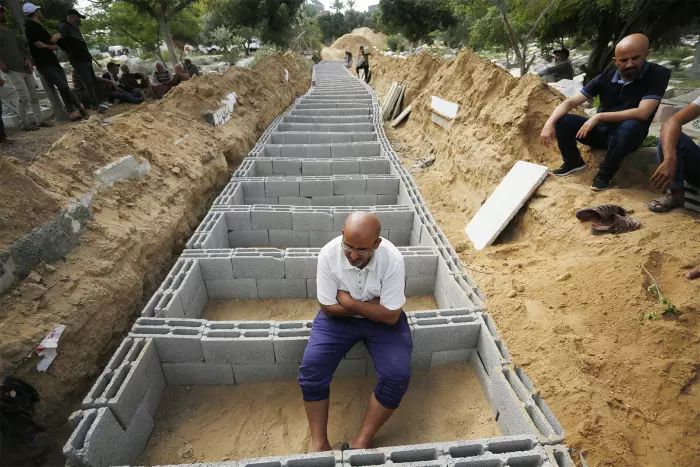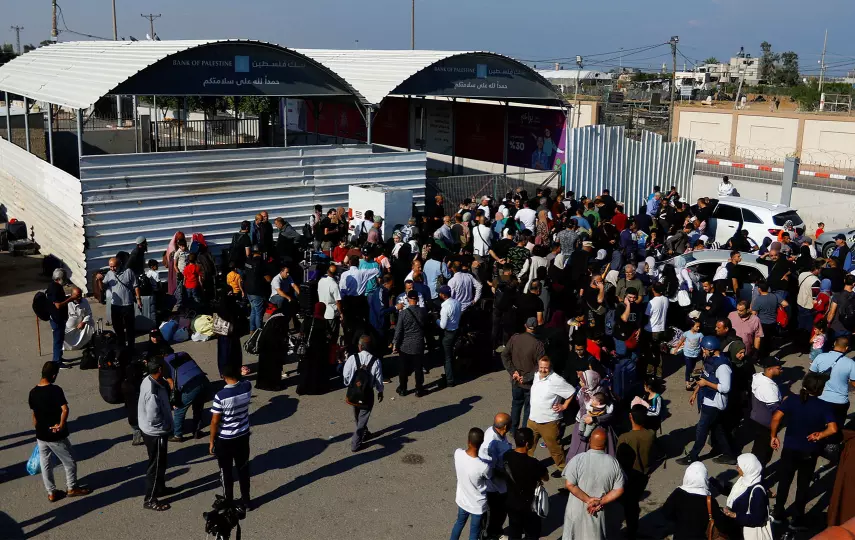
Ongoing hostilities between Hamas and Israel are exacting a brutal toll, especially on civilians, sparking accusations that both parties have breached international humanitarian law (IHL). But what exactly are these laws of war and how do they apply in this situation?
IHL is a set of rules on how parties to an armed conflict should conduct hostilities. Codified in the Geneva Conventions and other international conventions, these rules aim to limit some of the worst effects of fighting and to protect civilians.
“Obviously, both states and non-state armed groups respect [IHL] sometimes and violate it [at] others,” Marco Sassòli, a professor and leading expert on international law at the University of Geneva, Switzerland, says.
Importantly, IHL does not address the justifications that states and non-state armed groups might use for starting hostilities. “Humanitarian law deals only with the means employed [once hostilities begin],” Sassòli said.
As such, it can be a narrow lens for viewing and understanding what is happening in Palestine and Israel. But IHL still plays an important role in terms of acting as a deterrent for abuses, and as a potential avenue for accountability.
“The difference between war and crime is that there are rules about how to conduct war,” said Sassòli.
However, there has been a double standard in terms of where the international community has shown the political will to pursue accountability, according to Sassòli, who pointed to the speed at which alleged Russian violations have been investigated in Ukraine compared to other contexts around the world.
Since October 7, Israel’s bombardment of Gaza has killed over 3,000 people and injured more than 12,500 others, with women and children accounting for over 60 per cent of those killed, as of the latest death toll on October 17. The Israeli military and settlers have also killed at least 61 people in the West Bank, and injured 1,250, amid increasing violence there as well.
The bombardment of Gaza was launched in response to Hamas gunmen breaching the security barrier surrounding the enclave on October 7 and killing at least 1,400 people – many of them civilians – injuring 3,400 others, and taking around 200 hostages.
Since October 9, Israel has also imposed a complete siege on Gaza, which is governed by Hamas, cutting off electricity and water and blocking the entry of food, fuel and medical supplies. Efforts to open a humanitarian corridor at Gaza’s Rafah border crossing with Egypt for the delivery of aid have so far failed.
Over 1,200 people are also thought to be trapped under the rubble of destroyed buildings in Gaza. And out of a population of 2.3 million, an estimated one million have been displaced, according to the UN’s emergency aid coordination body, OCHA. Overwhelmed hospitals attending to the wounded are reportedly running out of fuel to power generators and medical supplies, food supplies are dwindling, clean drinking water is scarce, and concerns about the potential outbreak of water-borne disease are growing.
The New Humanitarian sat down with Sassòli recently to discuss these events – and also the situation in the Occupied Palestinian Territories more broadly. The conversation covered a range of topics including: what constitutes a violation of IHL; what rights Palestinians have to resist occupation, and Israel has to self-defence; and how relevant IHL is in a world where enforcement mechanisms are few and far between, and selectively applied.
This interview has been edited for length and clarity.
The New Humanitarian: Do Palestinians have a right to resist Israeli occupation under international law, and does that right include armed resistance?
Sassòli: Yes, this right exists under public international law, not international humanitarian law. Humanitarian law says, even if you have a just cause, you have to comply with humanitarian law. The Palestinians may exercise their right to self-determination, and they have a claim that would take a long time to discuss, but it is not unreasonable that they have the right to use force to exercise their right to self-determination and to resist occupation.
But, as everyone who makes war, even for a just cause, they have to comply with IHL. Same for Israel. Israel has a right to self-defence, but it also has to comply with IHL. Both parties of all armed conflicts claim they are right. The victims, it’s not their responsibility that their party has violated the UN Charter or the right to self-determination or whatever.
The New Humanitarian: Are there precedents of armed resistance to occupation being lawful?
Sassòli: The fight to exercise self-determination concerning South Africa when it was Apartheid South Africa; the UN General Assembly has several times declared that the use of force by neighbouring states, or support provided by neighbouring states to South Africans fighting the apartheid regime – so for the self-determination of the South African people – was justified.
The right to self-determination is similar to self-defence, it’s a justification to use force, but then you have to comply with the rules [of IHL]. And last Saturday, Hamas clearly did not.
The New Humanitarian: You mentioned apartheid, human rights groups have said Israel’s occupation of the West Bank and Gaza, as well as its treatment of Palestinian citizens of Israel, amount to crimes of apartheid. Is that claim supported by IHL? If so, how?
Sassòli: I understand these claims. But in the specific situation of an occupation, I think the law of occupation prevails over the concept of apartheid because the law of occupation requires an occupying power to treat the protected persons – in this case the Palestinians – differently from their own nationals.
Obviously, this occupation has lasted for such a long time. But the very concept of occupation is that you are in a foreign land provisionally and you have to treat those people not like your citizens. That would be annexation, and annexation is prohibited. So they must treat those people differently, and those people must live under their existing legislation and so on.
The problem, in my view, is that if Israel denies that these are occupied territories, then the apartheid issue [is relevant].
I’m not talking about the treatment of Arab Israelis because it is not really an international humanitarian law issue. We are talking about the Palestinians in the Occupied Territories and there it is in conformity with humanitarian law that they are not treated in the same way as Israeli citizens.
By the way, there shouldn’t be so many Israeli citizens in the Occupied Territories because settlements are prohibited by humanitarian law.
I can understand these humanitarian organisations saying Israel cannot have it both ways; you cannot deny that humanitarian law applies and then say, “Yes, we are just an occupying power, and therefore we treat those people differently than our own citizens”.
The New Humanitarian: Looking at Hamas’ October 7 incursion into Israel, what does IHL have to say about the killing of civilians and taking of hostages?
Sassòli: To the best of my understanding, most or many of these civilians were not even killed in hostilities. They were already in the power of the Palestinian group, and they executed them. Therefore, we don’t even have to check whether these people were soldiers or civilians. It is always a violation of humanitarian law – and a war crime – to execute prisoners or people who are in your power.
The taking of hostages as civilians is also prohibited. To arrest Israeli soldiers and to bring them back to the Gaza Strip is not taking hostages. But Hamas is not saying they are keeping them as prisoners of war as long as this war continues. They are saying they will execute them if Israel bombs them. Bombing Hamas is lawful, so this is clearly an indication that Hamas took them as hostages.
The New Humanitarian: Is the indiscriminate firing of rockets by Hamas into Israel prohibited under international law?
Sassòli: If it is indiscriminate, it is prohibited. In the past, for instance in the 2014 Gaza War, Hamas tried to make the argument that they were targeting military objectives but only had old fashioned rockets that were not very precise, and so on. They also made the argument that, because of the Iron Dome, the effect on the civilian population would not be disproportionate. And, indeed, at that time, there were relatively few Israelis who were killed or injured, while now this is very different.
So, I think this is a clear case of a violation of IHL. During the conduct of hostilities, determining whether IHL has been violated is always more difficult than when it comes to the treatment of people under your power. Nevertheless, in this case, I think it is clear that IHL has been violated in most of these rocket attacks.
The New Humanitarian: What rights do states have to self-defence and to respond to an attack like the one Hamas carried out?
Sassòli: The vast majority opinion, confirmed by the UN Security Council, is that you can exercise the right to self-defence not just against another state but also against an armed group.
But this is not a humanitarian law issue. Humanitarian law says that whether you are defending yourself or you are the aggressor, you have to comply with certain rules. It doesn’t care about the justification about the use of force.
As an international law professor, I can say that, in this case, Israel has a good case to act in self-defence to stop the attacks against Israel – but while doing so it must respect international humanitarian law.
The New Humanitarian: Does Israel have a right to carry out a ground invasion of Gaza, and under what conditions?
Sassòli: We have to distinguish between the justification of the war and the means that are employed. Humanitarian law deals only with the means employed.
Nevertheless, I would have to say that, if Gaza is an occupied territory, then it doesn’t matter if Israel redeploys in their occupied territory. Then, we come to humanitarian law, and there, in such a densely populated place as the Gaza Strip, an invader has to deal with the reality. It cannot simply evacuate everyone, and this is the basic idea of humanitarian law, that those who fight have to fight in the environment they find.
Under humanitarian law, they still have the right to attack military objectives or rocket-launching positions or command and control headquarters of Hamas. But in an environment that is so densely populated, they have to take special care for the civilian population. Nevertheless, even if they respect IHL, there would be plenty of civilian suffering from such a ground invasion.
- The New Humanitarian report










